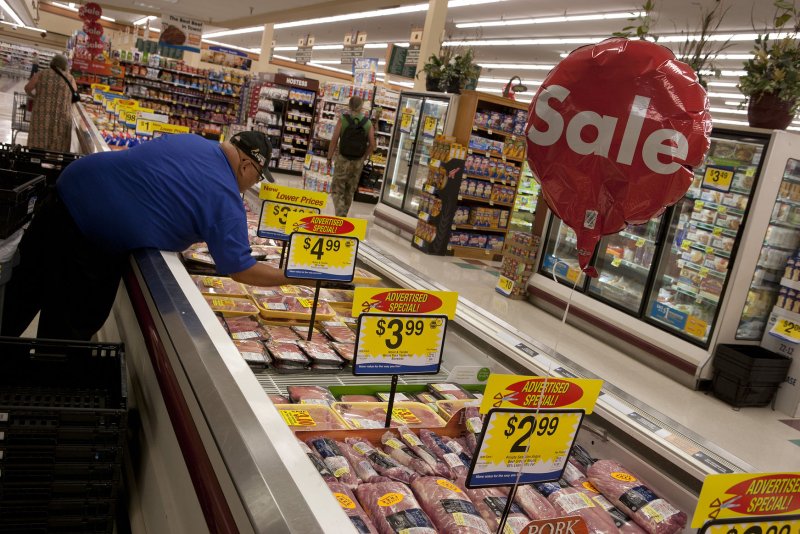A proposal by the U.S. government to cap income limits for food assistance threatens to strip benefits from million of Americans. File Photo by Gary C. Caskey/UPI |
License Photo
July 26 -- Millions of Americans are concerned a proposed change in government regulations will strip them of food benefits under the Supplemental Nutrition Assistance Program, or SNAP.
The Trump administration announced the proposal this week, which aims to put a hard cap on the income level required to receive SNAP benefits. As many as 3 million Americans could lose the assistance, as a result. President Donald Trump has called for a $220 billion reduction by 2030.
More than 600,000 may be in danger in Oregon, one of the states with the highest percentage of SNAP recipients -- almost half involving families with children, according to federal statistics.
In the past five years, federal spending on SNAP has fallen nearly 20 percent and the number of participants sunk to its lowest level in a decade, the Congressional Research Service said in an analysis.
"[SNAP] is under attack," Oregon Food Bank CEO Fook Bank Susannah Morgan said.
Experts say participation likely has declined because employment has risen.
"It should be significantly less than it currently is," a staffer of the House agriculture committee said, noting strong U.S. economic health. "Our states are not doing a great job in following up with people and introducing them to training and job opportunities."
Many employed in Oregon, however, are part-time, minimum wage or non-benefited workers.
"And in order to take those jobs you have to pay more for child care, which often offsets that so the demand can still be high for food assistance," Oregon Sen. Jeff Merkley said.
Oregon has a higher gross income limit than other states, and workers who earn less than 185% of the poverty guidelines -- $47,637 for a family of four -- are eligible for SNAP.
"Oregon has this higher limit because we recognize that it's disposable income not gross income that indicates whether or not your family is food insecure," Morgan said.
This high limit line seemed "abrupt and devastating" to Venus Barnes, a 42-year-old single Oregon mother of two who works at Portland Community College's Sylvania campus. With the help of the SNAP program for the last 10 years, she said she's been able to provide a home for her kids. Two months ago, her 21-year-old son began working -- and the benefits stopped.
"That's not the quality of life that the American dream promised us," she said. "SNAP means life and death."
Barnes no longer qualified for SNAP because her son's income put the household over the threshold. But as a construction worker, his wages are inconsistent. In order to get food benefits when he doesn't have work, Barnes said she must reapply and reiterate her situation every time.
"I can't keep filing paperwork," she said. "Who lives a life like that? Constantly have to prove my oppression? It's degrading. It's dehumanizing.
"[But] I still got my 11-year-old to feed."
The new government proposal may make Barnes' life even more difficult, and could amend SNAP eligibility "at any time," committee Republicans said. One suggestion is to eliminate or reduce the ability of states to grant benefits to those earning more than 130 percent of the poverty level ($33,475 for a family of four). More importantly, panel members say, is requiring that states verify assets.
In congressional testimony last month, a retired Minnesota man said he was eligible for SNAP while being a millionaire. Minnesota and Oregon are two of 38 states that don't check SNAP applicants' assets, officials said.
"This is something that you look throughout the years that has had bipartisan support to change," a committee staffer said. "It's not necessarily a fair bargain for the people who truly need this program."















